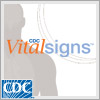Gynecologic Cancer Awareness

Actress Cote de Pablo appears in public service announcements (PSAs) and posters for the Inside Knowledge campaign. She talks about what happened when she delayed getting screened for cervical cancer, and she has a message for other women.
Inside Knowledge also has English and Spanish TV and radio PSAs that encourage women to listen to what their bodies are saying, and to learn the warning signs of gynecologic cancers.
All women are at risk for gynecologic cancers, and risk increases with age. You can lower your risk for some of these cancers.
Gynecologic cancers are cancers that start in a woman’s reproductive organs. The five main types are cervical, ovarian, uterine, vaginal, and vulvar cancer. Every year, more than 95,000 women in the United States are told they have a gynecologic cancer, and more than 30,000 women die from a gynecologic cancer.
Inside Knowledge: Get the Facts About Gynecologic Cancer Campaign
CDC’s Inside Knowledge: Get the Facts About Gynecologic Cancer campaign raises awareness about the five main types of gynecologic cancer. Inside Knowledge provides print materials, public service announcements (PSAs), and survivor stories in English and Spanish.
Symptoms
If you have vaginal bleeding that is unusual for you, see a doctor right away. If you notice any other unexplained signs or symptoms that last for two weeks or longer, talk to your doctor. When gynecologic cancers are found and treated early, treatment works best.
Prevention and Screening
Some gynecologic cancers are caused by the human papillomavirus (HPV), a very common sexually transmitted infection. A vaccine protects against the HPV types that most often cause cervical, vaginal, and vulvar cancers. While it is recommended for 11- and 12-year-old girls, the vaccine can be given to girls beginning at age 9 and to girls and women who are 13 to 26 years old who did not get any or all of the shots when they were younger. (The HPV vaccine also is recommended for boys and young men.)
Cervical cancer is the only gynecologic cancer that has a recommended screening test. The Pap test screens for cervical cancer and can find it early, when treatment works best. The Pap test also helps prevent cervical cancer by finding precancers, cell changes on the cervix that might become cervical cancer if they are not treated appropriately. Women should start getting the Pap test at age 21. The Pap test only checks for cervical cancer. It does not check for ovarian, uterine, vaginal, or vulvar cancers.
The HPV test looks for HPV infection. It may be used to screen women aged 30 years and older, or for women of any age who have unclear Pap test results. Learn more about the Pap and HPV tests.
Hereditary Ovarian Cancer
BRCA1 and BRCA2 are two genes that are important to fighting cancer. Sometimes a change or mutation occurs in the BRCA genes that prevents them from working normally. This raises a person’s risk for breast, ovarian, and other cancers. About 30 out of 100 women with a BRCA gene mutation will get ovarian cancer by the time they turn 70 years old, compared to fewer than 1 out of 100 women in the general U.S. population.
If you have a family history of breast or ovarian cancer or inherited changes in your BRCA genes, you may have a higher ovarian cancer risk. Talk to your doctor about genetic counseling, ways to reduce your risk, and what tests you may need to monitor your health.
Featured Resources
 A comprehensive brochure provides in-depth information on each gynecologic cancer.
A comprehensive brochure provides in-depth information on each gynecologic cancer.
 Inside Knowledge fact sheets provide basic information about each of the most common gynecologic cancers.
Inside Knowledge fact sheets provide basic information about each of the most common gynecologic cancers.
 Use this diary to track any symptoms you notice over a two-week period.
Use this diary to track any symptoms you notice over a two-week period.
 Terri makes it her mission to help women who have or are at risk for ovarian cancer. Read her story.
Terri makes it her mission to help women who have or are at risk for ovarian cancer. Read her story.
 Videos offer important information about gynecologic cancers.
Videos offer important information about gynecologic cancers.
 The “Cervical Cancer is Preventable!” podcast explains how to help prevent cervical cancer.
The “Cervical Cancer is Preventable!” podcast explains how to help prevent cervical cancer.
- Page last reviewed: September 14, 2017
- Page last updated: September 14, 2017
- Content source:
- Maintained By:


 ShareCompartir
ShareCompartir